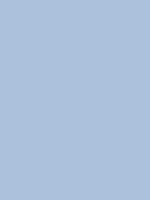#abc1da Color Information
In a RGB color space, hex #abc1da is composed of 67.1% red, 75.7% green and 85.5% blue. Whereas in a CMYK color space, it is composed of 21.6% cyan, 11.5% magenta, 0% yellow and 14.5% black. It has a hue angle of 211.9 degrees, a saturation of 38.8% and a lightness of 76.3%. #abc1da color hex could be obtained by blending #ffffff with #5783b5. Closest websafe color is: #99cccc.
-
- R 67
- G 76
- B 85
-
- C 22
- M 11
- Y 0
- K 15
● #abc1da color description : Very soft blue.
#abc1da Color Conversion
The hexadecimal color #abc1da has RGB values of R:171, G:193, B:218 and CMYK values of C:0.22, M:0.11, Y:0, K:0.15. Its decimal value is 11256282.
| Hex triplet | abc1da | #abc1da |
|---|---|---|
| RGB Decimal | 171, 193, 218 | rgb(171,193,218) |
| RGB Percent | 67.1, 75.7, 85.5 | rgb(67.1%,75.7%,85.5%) |
| CMYK | 22, 11, 0, 15 | |
| HSL | 211.9°, 38.8, 76.3 | hsl(211.9,38.8%,76.3%) |
| HSV (or HSB) | 211.9°, 21.6, 85.5 | |
| Web Safe | 99cccc | #99cccc |
| CIE-LAB | 77.196, -2.112, -14.983 |
|---|---|
| XYZ | 48.517, 51.859, 73.779 |
| xyY | 0.279, 0.298, 51.859 |
| CIE-LCH | 77.196, 15.131, 261.975 |
| CIE-LUV | 77.196, -12.66, -22.953 |
| Hunter-Lab | 72.013, -5.764, -10.335 |
| Binary | 10101011, 11000001, 11011010 |
Color Schemes with #abc1da
Alternatives to #abc1da
Below, you can see some colors close to #abc1da. Having a set of related colors can be useful if you need an inspirational alternative to your original color choice.
#abc1da Preview
This text has a font color of #abc1da.
<span style="color:#abc1da;">Text here</span>This paragraph has a background color of #abc1da.
<p style="background-color:#abc1da;">Content here</p>This element has a border color of #abc1da.
<div style="border:1px solid #abc1da;">Content here</div>.text {color:#abc1da;}.background {background-color:#abc1da;}.border {border:1px solid #abc1da;}Shades and Tints of #abc1da
A shade is achieved by adding black to any pure hue, while a tint is created by mixing white to any pure color. In this example, #05080b is the darkest color, while #fdfdfe is the lightest one.
-
#05080b
#05080brgb(5,8,11) -
#0b1219
#0b1219rgb(11,18,25) -
#111b27
#111b27rgb(17,27,39) -
#172534
#172534rgb(23,37,52) -
#1d2e42
#1d2e42rgb(29,46,66) -
#23384f
#23384frgb(35,56,79) -
#29415d
#29415drgb(41,65,93) -
#2f4b6b
#2f4b6brgb(47,75,107) -
#355478
#355478rgb(53,84,120) -
#3b5e86
#3b5e86rgb(59,94,134) -
#416893
#416893rgb(65,104,147) -
#4771a1
#4771a1rgb(71,113,161) -
#4d7baf
#4d7bafrgb(77,123,175)
-
#5985b6
#5985b6rgb(89,133,182) -
#678fbc
#678fbcrgb(103,143,188) -
#7599c2
#7599c2rgb(117,153,194) -
#82a3c8
#82a3c8rgb(130,163,200) -
#90adce
#90adcergb(144,173,206) -
#9db7d4
#9db7d4rgb(157,183,212) -
#abc1da
#abc1dargb(171,193,218) -
#b9cbe0
#b9cbe0rgb(185,203,224) -
#c6d5e6
#c6d5e6rgb(198,213,230) -
#d4dfec
#d4dfecrgb(212,223,236) -
#e1e9f2
#e1e9f2rgb(225,233,242) -
#eff3f8
#eff3f8rgb(239,243,248) -
#fdfdfe
#fdfdfergb(253,253,254)
Tones of #abc1da
A tone is produced by adding gray to any pure hue. In this case, #c2c2c3 is the less saturated color, while #8abffb is the most saturated one.
-
#c2c2c3
#c2c2c3rgb(194,194,195) -
#bec2c7
#bec2c7rgb(190,194,199) -
#b9c2cc
#b9c2ccrgb(185,194,204) -
#b4c2d1
#b4c2d1rgb(180,194,209) -
#b0c1d5
#b0c1d5rgb(176,193,213) -
#abc1da
#abc1dargb(171,193,218) -
#a6c1df
#a6c1dfrgb(166,193,223) -
#a2c0e3
#a2c0e3rgb(162,192,227) -
#9dc0e8
#9dc0e8rgb(157,192,232) -
#98c0ed
#98c0edrgb(152,192,237) -
#94c0f1
#94c0f1rgb(148,192,241) -
#8fbff6
#8fbff6rgb(143,191,246) -
#8abffb
#8abffbrgb(138,191,251)
Color Blindness Simulator
Below, you can see how #abc1da is perceived by people affected by a color vision deficiency. This can be useful if you need to ensure your color combinations are accessible to color-blind users.
